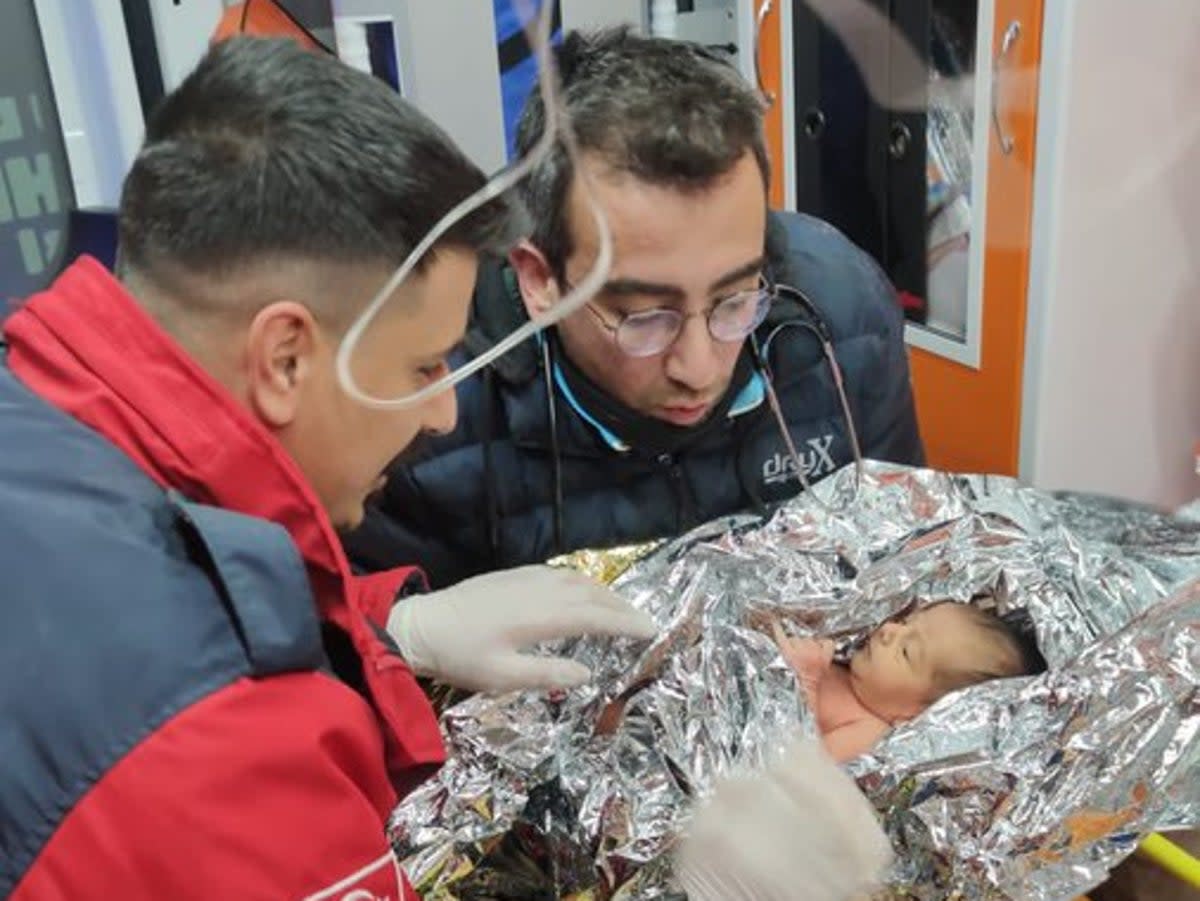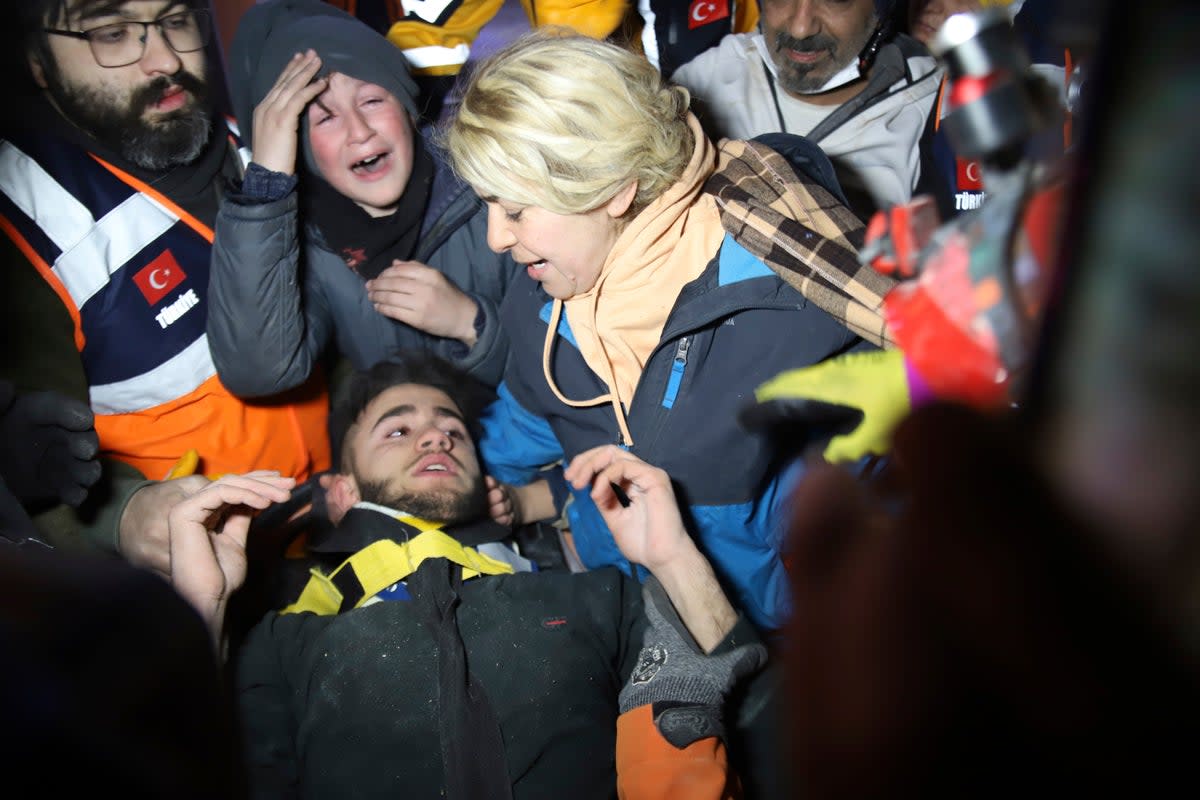Turkey earthquake: 10-day-old baby saved after spending almost half his life under rubble
A newborn baby and his mother have been rescued from the rubble in Turkey, around 90 hours after the first of the deadly earthquakes to strike the country and Syria.
The 10-day-old boy, named Yagiz Ulas, was retrieved from a wrecked building in the southern Hatay province, which has suffered terrible damage in the disaster.
Crouched under concrete slabs and whispering “inshallah” [God willing], a rescuer carefully reached into the rubble, then passed the baby down the line of his team members. His eyes wide open, the boy was wrapped in a shiny thermal blanket and carried to a field medical centre in the town of Samandag. Emergency workers also carried his mother, dazed and pale but conscious, on a stretcher, video from Turkey's disaster agency showed.
As the day progressed, there were a number of other rescues in the country. Six people were pulled from a collapsed building in Iskenderun, also in Hatay province, after spending 101 hours beneath the rubble, rescue workers have said.
The six people, all relatives, were helped to survive by huddling together in a small pocket left within the collapsed building, said Murat Baygul, a search and rescue worker told the Associated Press.
In Nurdagi, near Iskenderun, a Spanish rescuer said "I got him, I got him, let's go" as he pulled a whimpering two-year-old boy from a collapsed building. A human chain of soldiers from the Spanish Military Emergencies Unit (UME) moved the boy, Muslim Saleh, to a heated tent, and minutes later pulled out his six-year-old sister, Elif, and then their mother, all of them alive.
In the town of Kahramanmaras, about 110 miles north of Iskenderun, orange-clad workers found a toddler in a collapsed building who was crying as dust fell into his eyes.
Further to the east, the fearful face of another young boy looked out from a pancaked building, his cries rising above the sound of the drills and grinders trying to free him on Friday morning in the Kurdish-majority city of Diyarbakir. Like baby Yagiz, he was followed by his mother, on a stretcher, 103 hours after the earthquake struck.
"They did not need much treatment, just love, warmth, water and a little fruit," Aurelio Soto, a UME spokesman, told Reuters.
The Independent is appealing for help in raising urgently needed funds following the deadliest earthquake to hit Turkey and Syria in almost a century
Elsewhere, a teenager was pulled largely unscathed from beneath the rubble of a collapsed building in the Turkish city of Gaziantep, close to the epicentre of the first earthquake. Before dawn on Friday, also in Gaziantep, rescuers pulled Adnan Muhammed Korkut from the basement where had been trapped since the quake struck on Monday.
The 17-year-old beamed a smile at the crowd of friends and relatives who cried tears of joy as he was carried out and put onto a stretcher.
"Thank God you arrived," he said, embracing his mother and others who leaned down to kiss and hug him as he was being loaded into an ambulance. "Thank you everyone."

Trapped for 94 hours, but not crushed, the teenager said he had been forced to drink his own urine to slake his thirst. "I was able to survive that way," he said.
A rescue worker, identified only as Yasemin, told him: "I have a son just like you.
"I swear to you, I have not slept for four days. I swear I did not sleep; I was trying to get you out."
The 7.8 magnitude earthquake hit the border region between Turkey and Syria, killing more than 23,000 people and leaving many more injured. The death toll in Turkey has risen to to 19,875, according to the country’s disaster management agency. The president, Recep Tayyip Erdogan, said 77,711 people had been injured. The number of deaths in neighbouring Syria – which has faced almost 12 years of civil war – has been put at 3,377 across both government-held and rebel-held regions.
Tens of thousands have also been left homeless. The first tremor was followed by another 7.5 magnitude quake in central Turkey and dozens of aftershocks. While the myriad rescues have provided some relief, the chances of finding many more survivors are shrinking by the hour.
In northwestern Syria, the first UN aid trucks since the quake to enter the rebel-controlled area from Turkey arrived on Thursday, underlining the difficulty of getting help to people there. The World Food Programme (WFP) said on Friday that it was already running out of stocks it already had in northwest Syria and called to open more border crossings from Turkey after both countries were ravaged by earthquakes.

"Northwest Syria, where 90 per cent of the population depends on humanitarian assistance, is a big concern. We have reached the people there, but we need to replenish our stocks," Corinne Fleischer, WFP regional director in the Middle East, Northern Africa and Eastern Europe, said.
"We are running out of stocks and we need access to bring new stocks in. The border crossing is open now, but we need to get new border crossings open."
The UN has pushed for aid to flow more freely into Syria, especially into the country’s northwest – an area controlled by rebels opposed to President Bashar al-Assad – via frozen frontlines and through crossings with Turkey. The world body has delivered aid to the northwest since 2014 via Turkey, bypassing territory controlled by the government. Aid has seldom moved from government-held territory to the northwest, where many Syrians fled to escape Assad’s rule and some 4 million people were in need of aid before the earthquake made their predicament even worse.
Later in the day, Syria's government approved humanitarian aid delivery across the frontlines of the country's civil war, state media said. A move that could speed up the arrival of help for millions of people affected by Monday's deadly quake.
Aid distribution will take place in cooperation with the UN, the International Committee of the Red Cross and the Syrian Arab Red Crescent, state media said, to “guarantee the arrival of this aid to those who need it”. It did not say when deliveries would take place.
The winter weather and damage to roads and airports has also hampered the response in both countries.
Turkey's disaster-management agency said more than 110,000 rescue personnel were now taking part in the effort and more than 5,500 vehicles, including tractors, cranes, bulldozers and excavators had been shipped.
For regular updates on the appeal sign up to our Morning Headlines newsletter by clicking here
Associated Press and Reuters contributed to this report
